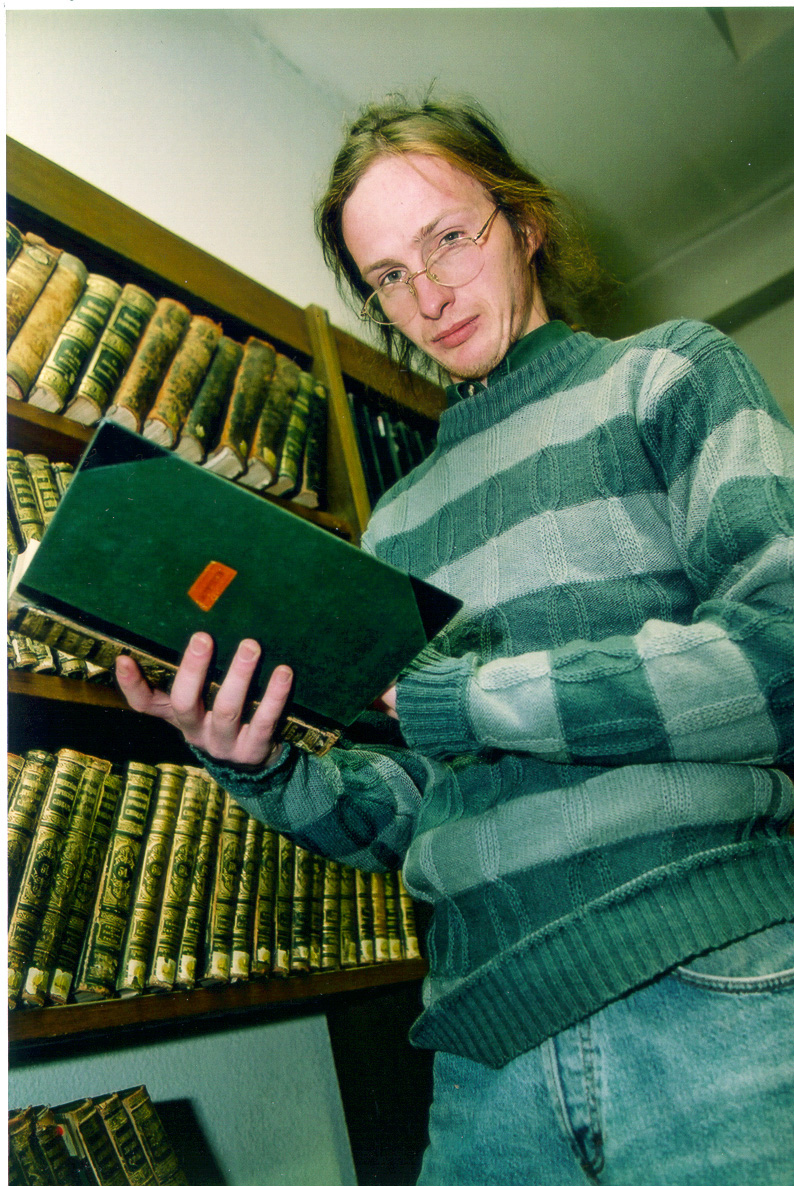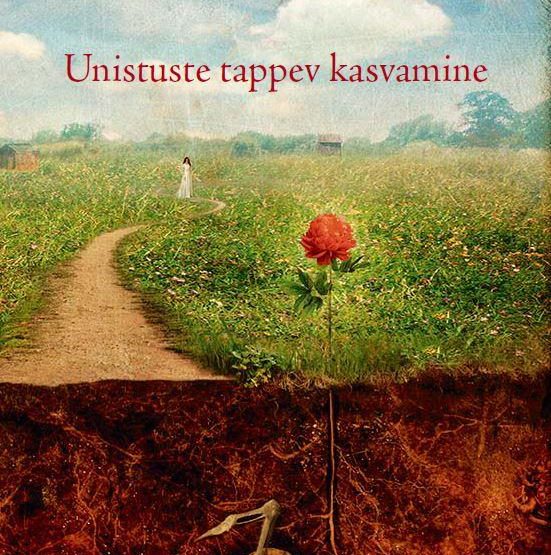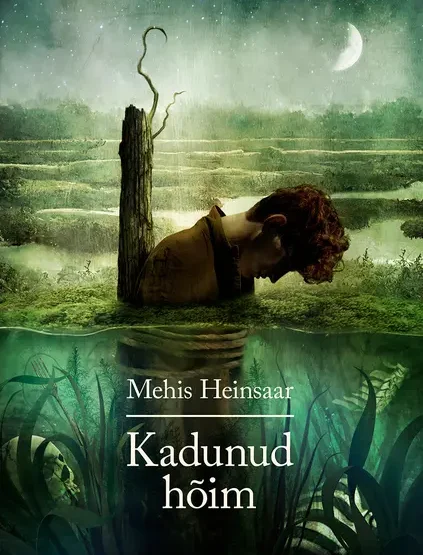For his Tartu-flavoured, superbly imaginative short stories the young writer Mehis Heinsaar (28) has received two prestigious literary awards during the last two years.
The following interview was taken, in an abridged form, from the magazine Looming, no 1, 2002.
Mehis Heinsaar: I started writing poems at 16-17, as people do. It seemed a natural thing to do. Not that the poems were anything special. I actually wanted to become a long-distance runner. Somehow writing took over. In a way it is still a kind of long-distance running.
Sven Vabar: You think the same thing made you keen on both activities?
MH: Well, it was a kind of rhythm, something inside that one day resulted in writing poems and stories.
SV: Do you still run?
MH: No, but I ride my bicycle. Physical and mental balance is of utmost importance, especially in autumn and winter. You may keep reading and writing, but when the mind is weak, nothing happens.
SV: You have graduated from the university and are a freelancer.
MH: Yes, and that suits me fine. I can’t imagine having a regular job. Just like a real marathon starts after the 35th kilometre, so story writing demands a lot of initial effort and then intense concentration. First comes the image, occasionally like a blow on the head. Then rewriting, and after the 35th kilometre, when you’ve been sitting at home for several days waiting for the mood for the final rewriting, only then do the best ideas turn up. To do some other work, besides that… I certainly couldn’t manage that. Doing one thing requires so much concentration.
SV: So the everyday hassle thwarts the emergence of images?
MH: Yes, but such images also require a nature that seeks itself. I sometimes lose myself completely, and then have to start looking for myself. In the course of this search, I come upon stories. It is like a constant hunt where I am both the hunter and the prey. My ideal is to find the right me and start living a decent bourgeois life. Until I find this, I will continue writing stories.
SV: So when you find that, you will quit writing?
MH: Yes, the very same day. However, I know I won’t find it. I know myself too well. Once I found such an image – the right me as a doctor in a mental hospital with 99 madmen. These madmen are all personalities, but have no control over anything. They keep blabbering incoherently and the doctor, who maybe cannot write anything himself, scribbles down his patients’ stories and turns them into proper stories. Such a decent bourgeois life remains a dream, although I’d like that more than my present existence.
SV: The character Columbus crops up fairly often in your book Mr Paul’s Chronicles. He is also a seeker, although he is more positive than the doctor at the loony bin.
MH: I have indeed pined for the feeling Columbus must have felt when he saw a strip of land on the horizon. It is, however, also possible to experience this feeling of discovering the world today.
SV: Have you experienced this feeling more often recently?
MH: I have found ways leading to such an experience. It’s like chemistry, or putting together pieces of mosaic. Reading various books, less fiction and more scientific, philosophical books. Once you get inside such a world, there is ample opportunity to travel around; the experience is later reflected, and a new story is born.
SV: So writing is a paradoxical situation for you, a hunter’s life, an endless exacting hunt for your own self or selves, but there is the joy of discovering the world as well. When you finish writing, do you then feel good?
MH: Yes… It feels as if you have just discovered America. This feeling is so intense at times that a few hours of it equal a week’s ordinary existence, or even a few months’.
SV: Despite what you say about never quite making it and not being able to live a bourgeois life, your work seems to have become somewhat more realistic, containing less of the absurd. Aren’t you afraid of calming down?
MH: Not yet, no. I would like to find something great in small trivial things, too much fantasy might kill the reader’s interest. I think the everyday and the mythical world should grate a bit. The mythical should emerge from inside. It’s nice to have a calm peaceful story with an image somewhere in its undercurrent. I’m fascinated by what a human being feels and thinks when he stands on the seashore in the evening watching the sunset and horizon and when an anxiety overwhelms him – he would like to have, obtain something… as if the gods of this world were mocking him, because surely men could be much happier than he is.
SV: Your work is quite dreamlike. Are the dreams valuable material to be used?
MH: I have no talent for dreams, I cannot usually even remember them.
SV: You read a lot, but what else do you like to do?
MH: Many places in Estonia where I go on my bike are like temples without walls. I find peace there. It doesn’t necessarily have to be your real home to feel at home. An inner peace is necessary. Sometimes it happens in an airport. You are suddenly at ease with the world, happy.
SV: We talked about your stories getting longer. You are now writing a novel, aren’t you?
MH: I am indeed. I would like to devote a year or two to it, but I got a Cultural Endowment grant so I think I ought to finish it within a year. Otherwise a conflict might arise. At the same time I set high standards – a professional writer cannot produce anything second-rate – it would mean cheating the readers. Many excellent writers write very quickly; they have a good idea but realise it too fast. As a result, the book is significant for only a short while. I would like to produce something that is worth reading twenty years later.
SV: When you aren’t writing, what do you do these days?
MH: I’m finishing a story of a few dozen pages or so, but the ending still takes some effort because so many external things keep interrupting me. I haven’t been able to concentrate. Sometimes I spend hours at the computer and type a few lines. I cannot deceive myself. Of course I know what the ending is like, but I need to travel through the entire story, feel every single word. This kind of perception requires concentration, peace and solitude.
SV: Where in Tartu do you find that, if you’re not sitting at your computer?
MH: I cycle in the vicinity of Tartu, or walk along side streets to avoid bumping into friends who might ask me out for a drink. My resolve is not too firm. I readily go out with friends. And it takes so much time later to be able to concentrate. Tartu is an excellent environment for creative work.
SV: Are you happy about living in Estonia here and now, spending your time writing?
MH: I think so, yes. I have naturally sometimes imagined how it would feel living and writing somewhere else… No, I am completely satisfied to be here. It is not so bad, after all, that the Estonian population is only one million. It makes the writer concentrate on what’s most important. With a bigger population, there is always the danger of writing in order to please the readers, either consciously or semi-consciously. Many writers have gone that way. It would be really dangerous.
SV: I suppose you don’t actually have many readers?
MH: I have no idea about that. Maybe around five hundred – one thousand. That’s a big number to me. A composer built a hall for himself seating 17 – he said this was the suitable number of listeners.
SV: You are perhaps regarded as an introvert writer. Considering your work, do you think it is at all important that you are an Estonian writer and your stories are read by Estonians?
MH: Living and existing and developing in the Estonian language, if I can manage that, is, after all, precisely what I regard as being very Estonian.
SV: Will the role of nationalism increase in your work?
MH: Yes, I like to have the plot unravel in a fixed geographical area, and I feel that my stories suit the Estonian landscape. Writing them thus requires travelling around through all those places.
© ELM no 15, autumn 2002




